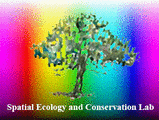Galapagos
Approach
My research on nature tourism has a theoretical foundation in land use and land cover change, political ecology, ecological and economic anthropology, conservation and development, and tropical ecology. My general interests concern unraveling the complex issues underpinning coupled human-natural systems and extending the theoretical and applied boundaries of human-environment interactions. My substantive research addresses the interactions among households, communities, and landscapes. In particular, I am interested in how these human-environment interactions result in changes in natural resources and their use. My research questions and approaches typically cross spatial and temporal domains and compare different political and economic regimes. My work employs both quantitative and qualitative methods, linking remote sensing and geographic information system (GIS) data and geospatial analysis with policy analysis and socioeconomic household surveys. For example, in Central America, I compared the effects of ecotourism development on household economy and landscape natural resource sustainability.
Areas of Interest
- Ecotourism: focused on understanding of ecotourism as a conservation and development strategy, especially in tropical areas with emphasis on human well-being and environmental conservation.
- Community based tourism: centered on local tourism initiatives with a cultural and natural component that are collectively owned.
- Sustainable tourism and land use dynamics: we use medium and high resolution satellite imagery to analyze the impacts of sustainable tourism on deforestation and reforestation.
- Sustainable tourism, forests, and wildlife: we use unmanned aerial vehicles and LiDAR & hyperspectral sensors, camera traps, and audio recorders to analyze impacts of tourism on forest structure and composition, and wildlife occurrence and abundance.
Geographic Areas
Our work centers on tropical areas. Currently have ongoing projects in Peru, Costa Rica, Brazil, & Ecuador!
